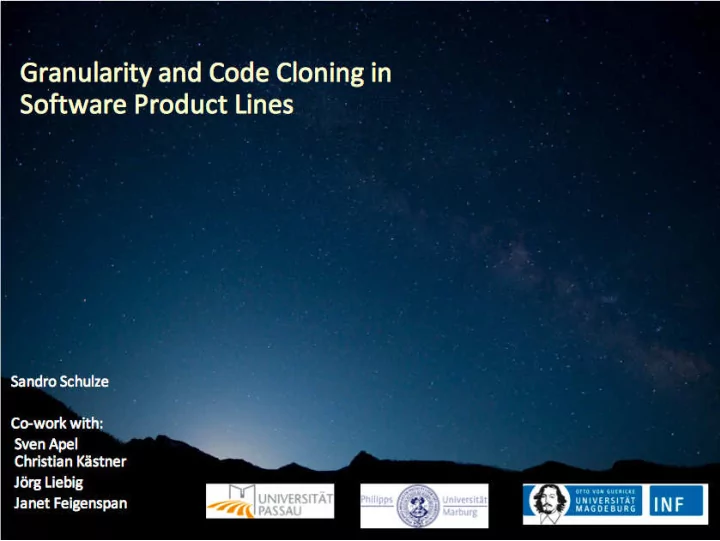

Who ¡are ¡your ¡parents? ¡ Where ¡is ¡the ¡code, ¡belonging ¡to ¡a ¡feature? ¡ Who ¡are ¡the ¡guys ¡you ¡hang ¡out ¡with? ¡ How ¡are ¡features ¡related ¡to ¡each ¡other? ¡ What ¡does ¡you ¡educa4on ¡cost? ¡ How ¡expensive ¡is ¡it ¡to ¡change ¡features? ¡
Conditional Compilation static int _rep_queue_filedone(...) DB_ENV *dbenv; REP *rep; __rep_fileinfo_args *rfp; { #ifndef HAVE_QUEUE COMPQUIET(rep, NULL ); COMPQUIET(rfp, NULL ); return (__db_no_queue_am(dbenv)); #else db_pgno_t first, last; u_int32_t flags; int empty, ret, t_ret; #ifdef DIAGNOSTIC DB_MSGBUF mb; #endif ... Excerpt from Oracle’s Berkeley DB
Objec4ons ¡/ ¡Cri4cism ¡ Designed in the 70 th and hardly evolved since “#ifdef considered harmful” “#ifdef hell” “maintenance becomes a ‘hit or miss’ process” “is difficult to determine if the code being viewed is actually compiled into the system” “incomprehensible source texts” “CPP makes maintenance difficult” “programming errors are easy to make and difficult to detect” “source code rapidly becomes a maze” “preprocessor diagnostics are poor”
A ¡CLOSER ¡LOOK ¡AT ¡PREPROCESSORS ¡ ¡
Separa4on ¡of ¡Concerns ¡
10000 2000 features features
find <ordner> -type f \( -name "*.h" -o -name "*.c" \) -exec egrep '^\s*#if' '{}' \; | sed -e 's/#ifndef//' | sed -e 's/ #ifdef//' | sed -e 's/#if//' | sort | uniq | wc -l
How ¡is ¡the ¡preprocessor ¡used ¡? ¡ (Liebig ¡et ¡al., ¡ICSE ¡'10) ¡ 23% of the code is variable Variable code mostly heterogeneous (89%) At ¡which ¡granularity ¡? ¡ (Liebig ¡et ¡al., ¡AOSD ¡'11) ¡ Variability mostly at coarse granularity (84%) What about the remaining 16% ?
TransformaAon ¡(Refactoring) ¡ Coarse-‑grained ¡annota4ons ¡prone ¡to ¡clones ¡ (Schulze ¡et ¡al., ¡SCAM ¡'11) ¡ ¡Good ¡or ¡Bad? ¡ ¡What ¡about ¡Program ¡Comprehension? ¡
push ¡ …. ¡ if ¡ ….. ¡ …. ¡ .. …. ¡ .. ¡ …. ¡ ... ¡ . ¡ Experiment ¡on ¡Program ¡Comprehension ¡of ¡ preprocessor ¡annota4ons ¡ Coarse-‑grained ¡vs. ¡fine-‑grained ¡ e.g., ¡Remove ¡all ¡code ¡that ¡belongs ¡to ¡Feature ¡IP_V6 ¡! ¡
[Kästner et al., ICSE '08] Views ¡
improved ¡Readability ¡ high ¡expresiveness ¡ reduced ¡programmer ¡effort ¡ language-‑independent ¡ composi4onality ¡ easy ¡to ¡use ¡ ¡ ¡ lower ¡expressiveness ¡ tangled/sca\ered ¡code ¡ bloated ¡code ¡→ ¡clones ¡ obfusca4on ¡→ ¡hard ¡to ¡ understand/modify ¡
Feature-‑Oriented ¡ ¡ Product ¡Lines ¡
Feature ¡Module ¡
Where ¡is ¡the ¡code, ¡belonging ¡to ¡a ¡feature ¡? ¡ Hard ¡to ¡determine ¡with ¡preprocessors; ¡modularity ¡helps ¡ How ¡are ¡features ¡related ¡to ¡each ¡other ¡? ¡ Alterna4ve ¡representa4ons ¡required, ¡e.g., ¡visualiza4on ¡ How ¡expensive ¡is ¡it ¡to ¡change ¡features ¡? ¡ Depends ¡on ¡granularity ¡and ¡separa4on ¡of ¡concerns ¡
What's ¡next... ¡ ...from ¡a ¡Provenance ¡Perspec4ve ¡ Iden4fying ¡featues ¡in ¡legacy ¡appica4ons ¡→ ¡variability ¡mining ¡ Reverse ¡Engineering ¡So_ware ¡Product ¡Lines ¡ → ¡commonali4es ¡and ¡variabili4es ¡ Evolu4on ¡of ¡So_ware ¡Product ¡Lines ¡
Ques4ons ¡
Program ¡Comprehension: ¡An ¡Experiment ¡ • #ifdef ¡vs. ¡colors ¡ • 43 ¡subjects ¡in ¡2 ¡ ¡ groups ¡ • S1-‑2: ¡search ¡tasks ¡ faster ¡with ¡colors ¡ ¡ (43% ¡& ¡23%) ¡ • M1-‑3: ¡maintenance ¡ tasks ¡same ¡perform. ¡ • M4: ¡maintenance ¡ ¡ task ¡with ¡red ¡back-‑ ¡ ground ¡color ¡-‑37% ¡ • No ¡influence ¡on ¡correctness ¡ • Subjects ¡prefer ¡colors ¡
Scaling ¡Visual ¡Representa4ons ¡ • Focus ¡on ¡few ¡features ¡at ¡a ¡4me ¡ • Repea4ng ¡colors ¡/ ¡manual ¡assignment ¡sufficient ¡ • Analysis ¡of ¡4 ¡Java ¡ME ¡and ¡40 ¡C ¡programs: ¡ • 96 ¡% ¡pages ¡of ¡source ¡code ¡with ¡≤ ¡3 ¡colors ¡ • 99 ¡% ¡pages ¡of ¡source ¡code ¡with ¡≤ ¡7 ¡colors ¡
static int _rep_queue_filedone(...) DB_ENV *dbenv; Error-‑Prone ¡ REP *rep; __rep_fileinfo_args *rfp; { #ifndef HAVE_QUEUE COMPQUIET(rep, NULL ); COMPQUIET(rfp, NULL ); return (__db_no_queue_am(dbenv)); #else db_pgno_t first, last; u_int32_t flags; #ifdef TABLES int empty, ret, t_ret; class Table { #ifdef DIAGNOSTIC void insert(Object data, Txn txn) { DB_MSGBUF mb; storage.set(data, txn.getLock()); #endif } // over 100 lines of add. code } } #endif #endif class Storage { #ifdef WRITE boolean set( … ) { ... } #endif }
Recommend
More recommend